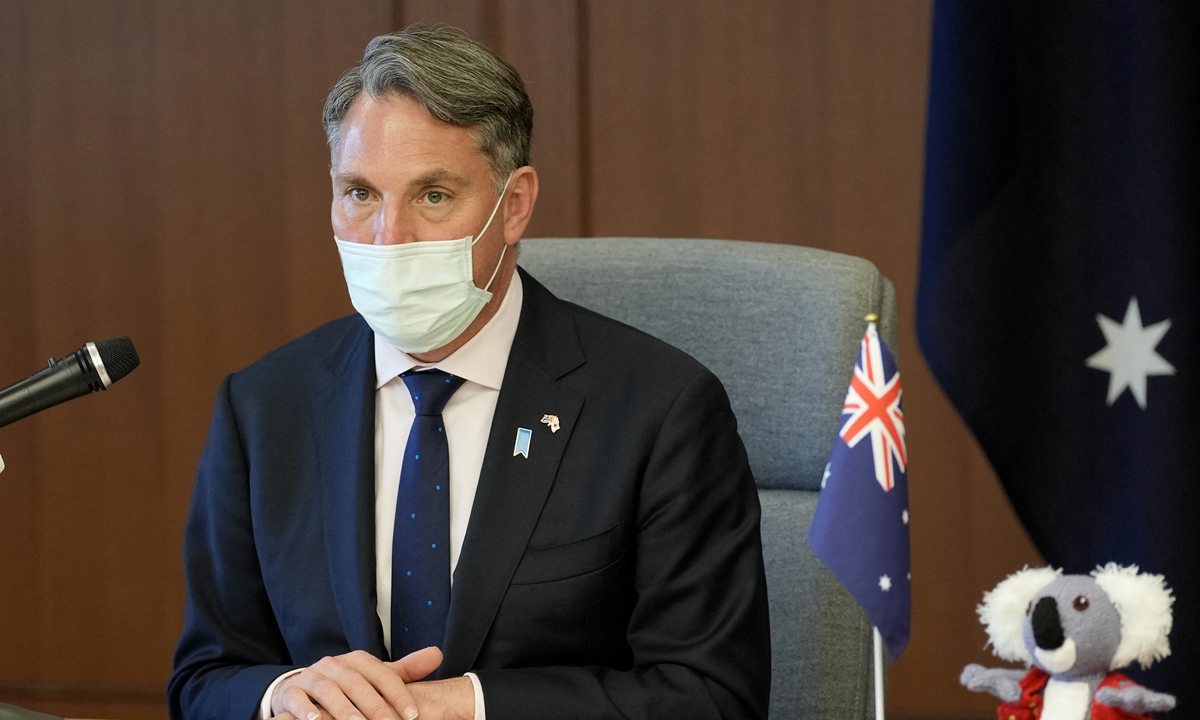
Australian Defense Minister Richard Marles Photo: AFP
Australia's attempts to incorporate Pacific Island countries into a regional defense bloc and serve as a "minor hegemony" in the region under US support would come to nothing as regional countries are very aware that what they want is development rather than being a chess pawn of Australia and the US to contain China, Chinese experts commented as South Pacific defense ministers met on Tuesday in Tonga with Australia reportedly seeking a closer military relationship in the region to "counter China's growing influence."
Australian Deputy Prime Minister and Defense Minister Richard Marles is on a five-day visit to the Kingdom of Tonga and Fiji from Monday to Friday. On Tuesday, he participated in the South Pacific Defense Ministers' Meeting (SPDMM) in Tonga, according to the website of the Australian government.
The SPDMM is the premier forum for Pacific defense ministers to discuss emerging and existing threats, key policy developments and collective responses to regional security challenges, according to the Australian government.
This year, the seventh SPDMM is being held on Tuesday and Wednesday in Nuku'alofa, capital of Tonga, with a focus on progressing initiatives to enhance coordination, increase interoperability and improve information sharing between SPDMM partners, according to regional media.
Delegates to the forum include those from member nations Australia, Chile, Fiji, France, New Zealand and Papua New Guinea, as well as those from observer nations Japan, the UK and US, media said.
The meeting came less than one week after Marles' visit to Papua New Guinea (PNG), during which Marles told media that Australia was negotiating a defense treaty with the latter that would see the two nation's navies and armies work alongside each other more often. Canberra also wants to evolve relationships with other Pacific islands, Marles was quoted as saying by media.
Without any camouflage under the pretext of "collaboration and aid," the plan proposed by Marles in PNG is the starkest attempt to militarize the Pacific region and weaponize the island countries to serve Australia's strategic targets, which in essence are part of Washington's "Indo-Pacific Strategy" aimed at deterring and containing China's development, Chen Hong, president of the Chinese Association of Australian Studies and director of the Australian Studies Centre at East China Normal University, told the Global Times on Tuesday.
According to this reckless plan, Australia will attempt to incorporate the Pacific Island countries into a regional defense bloc and itself would serve as a minor hegemony in the region as well as in the Indo-Pacific region under the US' strategy, Chen noted.
Some foreign media like Reuters deem that the SPDMM would serve as a new platform for Australia to seek a closer military relationship with Tonga, Fiji and PNG, the three island nations that have defense forces, to counter China's growing influence in the region.
When asked for comments on this, Chinese Foreign Ministry Spokesperson Wang Wenbin said at a press conference on Monday that "we hope that military cooperation between relevant countries is conducive to regional peace and stability and will not target any third party."
However, the island countries themselves do not have any worries about a phantom enemy fabricated by Australia and the US in order to make the islands nations follow them in their overall Indo-Pacific strategy. What they are concerned about the most are practical issues like climate change and economic development. These are their priorities, Chen noted.
South Pacific island nations are very aware of Australia and the US' intention to use them as a pawn to contain China. But a diplomatic principle they have upheld for a long time is being an enemy to none and friends to all. So, no matter what Australia plans to do in the region, it will come to nothing, Chen stressed.
Amid waves of accusations and complaints from Australia about a security agreement between China and the Solomon Islandsl, Manasseh Sogavare, prime minister of the Solomon Islands, hit back at Canberra's hypocrisy and hysteria. He criticized foreign powers for assuming that the Solomon Islands could not act in its own best interests. He insisted that it was utter nonsense to say that China posed a security threat in the Pacific. "We find it very insulting," he said, "to be branded as unfit to manage our sovereign affairs or have other motives in pursing our national interests," according to media reports.
There are also continuous objective and rational voices within Australia, including those from the country's
former prime minister Paul Keating, hoping to rectify the Australia's current China policy and the strategy of blindly following the US. Keating last week hit out at the G7 and the Quad for not including and "trying to contain China." Keating also urged the government to withdraw from the AUKUS defense pact.




